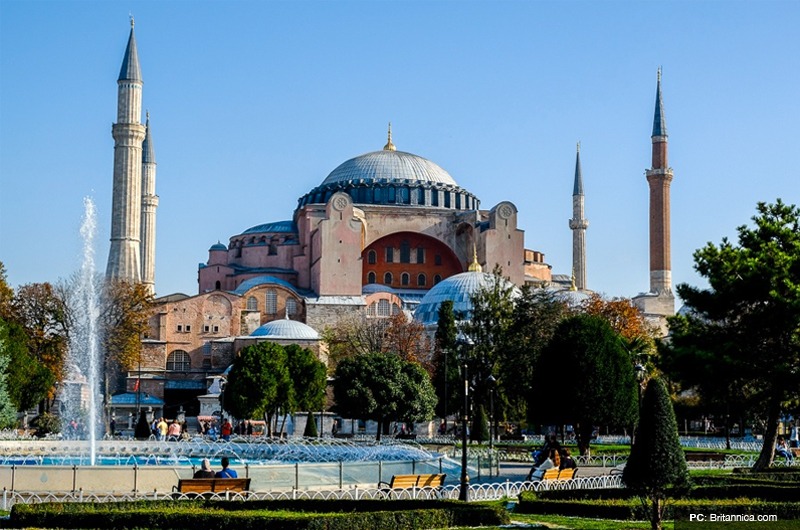The Splendid domed structure that served as a mosque in the Ottoman Empire and the main cathedral in the Byzantininan era, Turkey’s famous Hagia Sofia has long remained a marker of cultural multiplicity as well as sectrain unity. It was converted into a museum in 1934 , attracting multitudes of people from around the globe year round. The monument dates back y=to the 6th century B.C and has come into international focus after the religious and nationalists groups moved the court challenging the 1934 decision of the the Council of Ministers, headed by the founder of secular Turkey, Mustafa Kemal Ataturk, that resulted in the conversion of this historical monument into a national museum, symbolising the coming together of all the faiths in a unitary spirit of an unconsecrated nation.
Hagia Sofia is part of a pluralist Turkish heritage which was included in the UNESCO World Heritage Sites as a museum. The recent development, President Erdogan in a televised address to the nation, declared that Hagia Sofia would be converted into a mosque and the prayers can begin from 24th July. While the President has maintained in his address that the plural nature of the site would be protected, and people from all faiths and religion would be welcome, the future of the UNESCO site hangs in the air. There is a lot of speculation related to the nature of the site, and the future thereafter. Let’s look back a little. Earlier a Church during the Byzantine Empire, Hagia Sofia served as the main seat for Eastern Orthodox Church, until the 1400’s when the Ottoman conquest of Turkey took place, and its minarets were added to make it into a mosque. Since the 1934 decision of the modern Turkish seculars, Hagia Sophia was the epitome of secularism, and President Erdogan has been getting the backlashes from all corners, from the European Union, Greece as well as some Christian societies of the US.
The world had earlier responded in a rather disappointed overture to this heated debate over the contemporaneously disputed status of Hagia Sofia. After this decision UNESCO expressed its dismay and criticism by stating that as a part of the Historic Areas of Istanbul, Hagia Sophia qualifies as a world cultural heritage and any change in the status should not tamper with that valuation granted to it by UNESCO. This decision will have ramifications that could affect Turkey’s relationship with Greece in Thessaloniki, Greece’s second-largest city, people with Greek flags and Byzantine banners amassed outside a church modeled on Hagia Sofia, bearing the same name, in order to protest the decision. Since the museum was emblematic of the solidarity shared by various faiths and cultures in Turkey, Garo Paylan , an ethnic Armenian member of Turkey’s Parliament exclaimed via Twitter,
“A sad day for Christians & for all who believe in a pluralist Turkey.
The decision to convert #HagiaSophia into a mosque will make life more difficult for Christians here and for Muslims in Europe.
Hagia Sophia was a symbol of our rich history. Its dome was big enough for all.”
Patriarch Kirill, the leader of the Russian Orthodox Church, condemned Ankara’s decision and spoke in favour of a neutral status vis-à-vis Hagia Sophia. President Erdogan of Turkey exclaimed that Hagia Sofia’s conversion into a mosque will in no manner hamper its status as an insignia of religious harmony and its doors will be open to all faiths, locals as well as foreigners alike. The U.S. Secretary of State Mike Pompeo had made a comment last month that the museum should remain as it served as a “bridge between faiths and cultures, ” to which Turkey’s Foreign Ministry responded that Hagia Sofia was a local concern of Turkey and a matter where it can exercise its national sovereignty.









